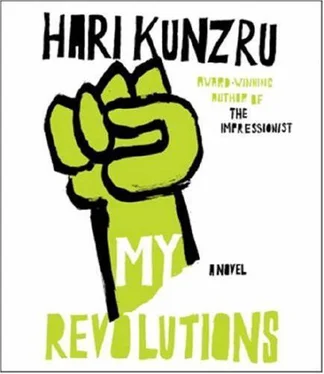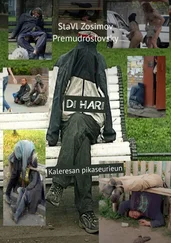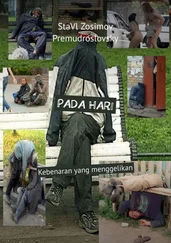At Thirteen we initially dismissed Hill’s plan as impractical. We were involved in what we euphemistically called our “community-defense work” and were debating whether to move to Dagenham and take jobs in the Ford factory, in order to organize the car workers. Still, we helped the Sylvan Close lot in peripheral ways and when, on the appointed day, the fence at the front was torn down and it was officially reopened we attended their street party. They had balloons, paper hats, cake, the whole thing. Someone had even managed to scrape together a ramshackle brass band, which farted its way through a few military marches until the bandsmen were distracted by the keg of beer donated by a local pub. It was the end of June, high summer, and the sun beat down
optimistically as the police arrived and were officially informed of the situation.
I remember it as one of those days when the future didn’t seem to require such an effort of will to imagine. It was right in front of us, an autonomous terrace of houses, organizing its own affairs. A little community. I remember sitting with Sean and Anna in the middle of the street, lounging on canvas deckchairs and surveying our undiscovered country while a gang of children with clownlike smears of orange juice round their mouths played a rough-and-tumble game in and out of the houses. The things we could do! Knock some walls together to make a library. Open a space up as a crèche. We could convert one area into a communal laundry, another into a bake house. Helen joined us and collectivized our imaginary gardens, planting vegetables and fruit trees, planning a compost heap, a pool, glasshouses, swings. It would be a life of luxury. We’d have saunas and windmills, solar panels, looms.
In the real world what we got was Keith Mallory. Mallory’s firm, New City Investigations, had a frightening reputation in east London. Some of Leo’s friends had been on the receiving end of a New City eviction in Stepney, which had left one of them with a fractured skull. Within a couple of days Mallory’s men were banging on doors in Sylvan Close, trying to wheedle their way inside. They shouted threats through letterboxes. They parked their van so it blocked the end of the street. For some reason the press wasn’t paying much attention and the papers that covered the story were just reproducing the council’s hysterical denunciations. The occupiers were delinquents, criminals, social deviants perversely helping people jump the housing queue.
The occupiers got increasingly panicky about eviction. There were several predawn false alarms. Sleep deprived, tempers started to fray. Groups had formed around different houses; some wanted to strengthen their fortifications in case of an eviction attempt; others thought this would create a bad impression. As a result, when Mallory’s men did attack, some places were much better barricaded than others. There were more than a hundred bailiffs.
Only three houses held out; by the time we heard about it, the families occupying the others were already back in their hostels.
The occupiers were terrified. One by one, over the next two days, the remaining homeless families dropped out. After that very few of the activists were prepared to carry on. The moderate faction, led by the Ellises, felt that without the families, it had become meaningless. This was when the Thirteen collective decided to move to Sylvan Close. We announced that we intended to hold the last three houses, whatever happened. We would make Sylvan Close the site of an open confrontation with the State.
If I say that for me the moon landing didn’t happen, I don’t mean I believe the conspiracy theories — the studio in Burbank, the misaligned shadows, or the unaccountably waving flags — just that the spasm of technocratic pride that apparently shuddered through the television-watching world didn’t penetrate the walls of the barricaded terraced house where I spent most of that month. As Neil Armstrong fumbled his prescripted line, I was on guard duty, blearily watching the street.
Mallory’s thugs left us alone for more than a week. Early one morning I was asleep upstairs in number thirty when I heard noise outside. I poked my head out of the window and saw men in army-surplus tin hats smashing windows and pushing ladders up against walls. In the middle of the street was Mallory, a stocky man in a sheepskin coat directing operations like a general at a siege. At the end of the road stood half a dozen policemen, observing.
The house was barricaded downstairs with heavy wooden beams. We’d installed a trapdoor, which allowed us to block off the first floor. As we watched, two bailiffs started to swing a battering ram against the front door, while two more tried to get a ladder up to the bedroom window. We emptied buckets of water and cans of paint over them, pushing the ladder away with sticks and metal scaffolding poles. Angry and keyed up, they started to scrabble around for missiles to throw at us. Milk bottles and bricks came flying up. The police did nothing.
I watched the bailiffs force their way into the house next door. Leo, Alex Hill, and some others were inside. Mallory’s coat got spattered with paint and he flew into a rage, producing a cosh from his coat pocket and laying into a young guy called Milo, who must have been dragged onto the street straight out of his sleeping bag. Wearing nothing but a pair of underpants he crouched on the ground, trying to protect his head with his arms. We shouted at the police, pointing out what was happening. They ignored Mallory and arrested the other people who were being pushed or dragged out.
When our front door gave way, we scrambled upstairs and dragged weights over the trapdoor. For a while the bailiffs tried to batter their way through, without success. Then they stopped. We couldn’t understand why until we noticed little plumes of smoke rising up through the gaps in the floorboards and realized they’d lit a fire downstairs. There were eight of us trapped up there. They were shouting at us from the street, daring us to jump out of the window. We had a couple of jerry-cans full of drinking water, so we soaked rags and tied them round our faces. Pushing open the hatch to the attic, we were lifting Sean up so he could smash an escape hole in the roof when the police finally intervened. I think it was because some reporters had arrived. The fire was put out and Mallory’s thugs were forced to leave. As they got back into their bus we sang the “Bandiera Rossa.” “ Avanti, popolo! Alla riscossa. . ”
We’d held two of the three houses. As soon as the bailiffs left we split into teams. People were sent for building materials, others for food and water, to organize lawyers for the people who’d been arrested.
Surrounded by the debris of battle, Anna and I smoked cigarettes and brewed tea on a Primus stove.
“What do you think?” she asked me.
“I think it’s like the Alamo.”
July was a heavy, muggy month. As we waited to be attacked, it was impossible to stay inside the stuffy little houses. Anna and I
made a kind of den in one of the unoccupied buildings, a roofless upstairs room, which we swept and furnished with a mattress and some rugs. It was open to the air but completely private, a secret place where we sunbathed and smoked dope and at night, by candlelight, acted out a series of increasingly confrontational and fetishistic sexual encounters. Anna gave orders. Hit me. Come on my face. I had the sense that my levers were being pulled, that I was the subject of one of her personal experiments: an analysis of the pathways between violence and sexual arousal in the white male.
I slapped her and she thanked me. I was disturbed to discover how angry I was with her, with women, with the world. Disturbed and turned on, just as she wanted. Sex for Anna was always an assault — on comfort, on the thing in herself she was trying to eradicate. Me, I wanted to smash myself up, to get rid of structure altogether.
Читать дальше












